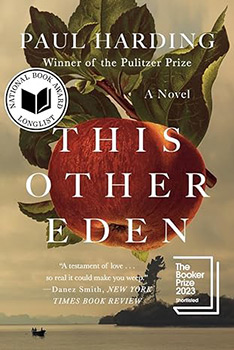Summary | Excerpt | Reading Guide | Reviews | Beyond the Book | Readalikes | Genres & Themes | Author Bio

Critics' Opinion:
Readers' Opinion:
First Published:
Jan 2023, 224 pages
Paperback:
Dec 2023, 224 pages
 Book Reviewed by:
Book Reviewed by:
BookBrowse First Impression Reviewers
Buy This Book
Excerpt
This Other Eden
Benjamin Honey—American, Bantu, Igbo—born enslaved—freed or fled at fifteen, only he ever knew—ship's carpenter, aspiring orchardist, arrived on the island with his wife, Patience, née Raferty, Galway girl, in 1793. He brought his bag of tools—gifts from a grateful captain he had saved from drowning or plunder from a ship on which he had mutinied and murdered the captain, depending on who said—and a watertight wooden box containing twelve jute pouches. Each pouch held seeds for a different variety of apple. Honey collected the seeds during his years as a field-worker and later as a sailor. He remembered being in an orchard as a child, although not where or when, with his mother, or with a woman whose face over the years had become what he pictured as his mother's, and he remembered the fragrance of the trees and their fruit. The memory became a vision of the garden to which he meant to return. No mystery, it was Eden. Years passed and he added seeds to his collection. He recited the names at night before he slept. Ashmead's Kernel, Flower of Kent, Duchess of Oldenburg, and Warner's King. Ballyfatten, Catshead.
After Benjamin and Patience Honey arrived on the island—hardly three hundred feet across a channel from the mainland, just under forty-two acres, twelve hundred feet across, east to west, and fifteen hundred feet long, north to south, uninhabited then, the only human trace an abandoned Penobscot shell berm—and after they had settled themselves, he planted his apple seeds.
Not a seed grew. Benjamin was so infuriated by his ignorance that over the next year he crossed to the mainland whenever he could spare some time and sought out orchards and their owners in the countryside beyond the village of six or seven houses, called Foxden, that stood directly across the channel from the island, and traded his carpentry skills for seeds and advice about how they grew and how to cultivate the trees and their fruit.
Benjamin and Patience and their sons and daughters and grandsons and granddaughters and great-grandchildren kept more and more to the island as time passed, but in the final years of the eighteenth century it was not as dangerous as it came to be later for Black man to range the land. Any able-bodied adult who kept peace and lent a hand surviving was accepted. So the story went among his descendants. So, Benjamin rambled around and found farms where he could help raise a barn or split shingles or clear an acre for crops and came home with seeds that quickened and struck roots and elaborated themselves into the shapes of his remembered paradise.
Roxbury Russets, Rhode Island Greenings, Woodpeckers, and Newtown Pippins. Benjamin Honey kept an orchard of thirty-two apple trees that began to bear fruit in the late summer of 1814, a decade after he planted them. Pippins were perfect for pies, Woodpeckers for cider. Children bit sour Greenings on dares and laughed at one another when their eyes watered and mouths puckered. Russets were best straight from the tree.
Benjamin Honey surveyed his orchard in the cooling air and sharpening, iridescent, ocean-bent sunset light, the greens and purples deepening from their radiant flat day-bright into catacombs of shadowed fruit and limb and leaf. It felt as if his mother were somewhere among the rows. She might step from behind a tree in a white Sunday dress that took up the shifting light and colors and smile at him. He inhaled the perfume, salted, as everything on the island, and took a bite of the apple he held.
ON THE FIRST day of spring, 1911, Esther Honey, great-granddaughter of Benjamin and Patience, dozed in her rocking chair by the woodstove in her cabin on Apple Island. Snow poured from the sky. Wind scoured the island and smacked the windows like giant hands and kicked the door like a giant heel and banked the snow up the north side of the shack until it reached the roof. The island a granite pebble in the frigid Atlantic shallows, the clouds so low their bellies scraped on the tip of the Penobscot pine at the top of the bluff.
Excerpted from This Other Eden by Paul Harding. Copyright © 2023 by Paul Harding. Excerpted by permission of W.W. Norton & Company. All rights reserved. No part of this excerpt may be reproduced or reprinted without permission in writing from the publisher.




There is no such thing as a moral or immoral book. Books are either well written or badly written. That is all.
Click Here to find out who said this, as well as discovering other famous literary quotes!
Your guide toexceptional books
BookBrowse seeks out and recommends the best in contemporary fiction and nonfiction—books that not only engage and entertain but also deepen our understanding of ourselves and the world around us.